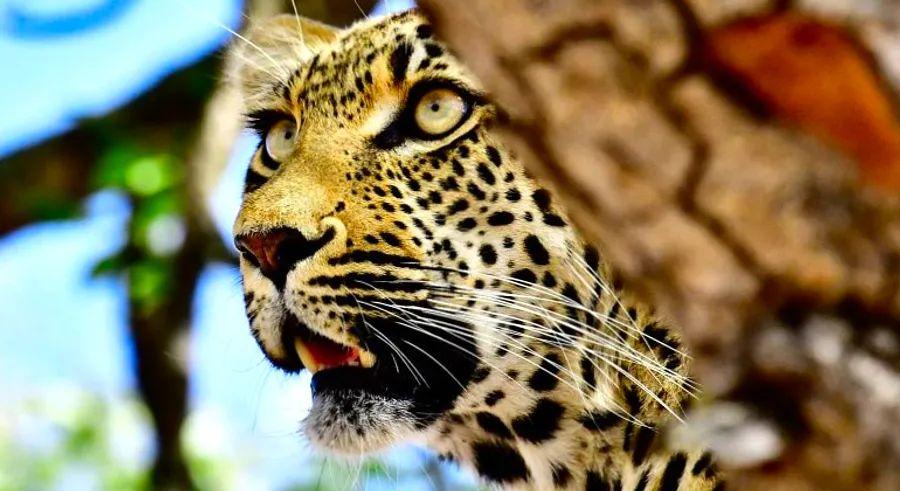How WildEarth Brings a Leopard Right Into Your Living Room

The elusive leopard, true to its nature, carefully navigates through thick grass as expert safari guide James Hendry drives the short wheelbase Land Rover into position for a clear view.
The big cat calmly walks next to the vehicle before disappearing into the bush where it had hidden its recent impala kill.
"We’ve got our kitty cats in view!" Hendry exclaims, adopting a tone reminiscent of a David Attenborough narration.
As the action unfolds, cameraman Owen Davis, sitting in the backseat, directs the camera toward Hendry, who answers questions coming from children around the globe.
"Hello Oscar. Yeah, I think this is really cool. It's definitely very cool," he says into the camera.

Sabi Sands Game Reserve, nestled on the edge of South Africa's Kruger National Park, is typically teeming with wealthy tourists.
However, amid the Covid-19 pandemic, Hendry and his cameraman are among the few remaining in the reserve.
They are one of four live guiding teams from WildEarth, a virtual safari company that broadcasts interactive game drives twice daily to homes around the world.
With global lockdowns in effect and children staying home, many are seeking distraction and comfort. Hendry believes WildEarth’s live safaris offer both healing and a sense of community.
"You know, the entire human race has been impacted by this one event," he reflects. "And there's a powerful sense of unity. Nature continues its course. It will carry on regardless."
Lifelines for those feeling isolated

Hendry remains with the leopards, their signal being relayed from the back of the Land Rover through a white microwave antenna to the WildEarth control room several miles away.
Inside a simple, earth-toned building resembling a large shed, a small team of three monitors the streaming signal, switches between four live feeds from the guiding teams, and manages incoming questions from the live audience.
"Jameson, age six, from the USA," the WildEarth director calls out into the guide’s earpiece. "Why do birds call out when they aren't the prey?"

Leopards sometimes hunt birds, so the virtual guide explains to Jameson that the birds prefer to call out a warning just in case.
WildEarth has been streaming safaris in one form or another for over 10 years, but with the surge in popularity during the pandemic, the volume of questions has increased dramatically. Now, the team struggles to keep up with the flood of viewer inquiries, with viewership rising five-fold.
"Especially during the lockdown, our live safaris have become immensely popular," says Graham Wallington, co-founder and CEO of WildEarth. "We receive countless messages from people expressing how much it helps with loneliness and providing the connection they need."
Wallington has spent his career bringing live nature experiences to viewers. In the late '90s, he pioneered waterhole live cams before the internet boom, and since then, he's expanded into live safaris, TV shows for channels like National Geographic, and even live underwater safaris.
According to him, what captivates virtual tourists isn't just the advancing technology—though it has improved—but the meaningful connections they form with the guides and the compelling narratives surrounding the animals.
Challenges with humans

However, a virtual experience can't replace the physical tourists and their spending, which are vital for the survival of reserves like Sabi Sands during the pandemic.
Tourism is what ensures the survival of rhinos, elephants, and leopards. 'Tourism funds this, and no one else will,' says Japie van Niekerk, owner of Cheetah Plains, a luxury game reserve in Sabi Sands.
He emphasizes that building trust with local communities surrounding the reserve took years, and if his business cannot afford to pay employees or sustain its conservation efforts, that trust will be lost.

While Cheetah Plains continues to pay its staff, roughly three thousand people are employed across Sabi Sands, with most of them coming from nearby communities.
Even during the Covid-19 pandemic, safari companies and reserves can’t simply shut down. They must maintain essential conservation work, including anti-poaching patrols.
The animals don’t experience lockdown, so they must still be protected, especially from human threats, says van Niekerk.
The World Travel and Tourism Council estimates that nearly eight million tourism-related jobs could be lost across Africa due to Covid-19. Even with the pandemic's decline, the safari sector may struggle for years.
Virtual tours for a fee

Nicole Robertson, the Chief Marketing Officer of &Beyond, one of the leading global luxury safari operators, warns that numerous factors need to align before travelers can return. The uncertainty of the situation is a major concern.
Due to ongoing travel restrictions, including flight, visa, and health protocols, &Beyond predicts a financial downturn lasting 12 to 15 months.
In an effort to stay relevant and maintain its conservation message, &Beyond has teamed up with WildEarth to offer virtual experiences of Ngala, their exclusive safari property in Kruger National Park, aiming to engage future guests.
Wallington is concerned that simply raising brand awareness won’t suffice. His team is focused on further developing their offering by introducing paid virtual safaris, imagining families from New York or London booking private tours with expert guides.
If people are willing to spend thousands to visit in person, perhaps they would consider paying a smaller fee for a virtual safari experience.
“We need to figure out how to create private online safari experiences that can generate revenue for the local communities and keep conservation efforts alive,” he says.

1

2

3

4

5
Evaluation :
5/5